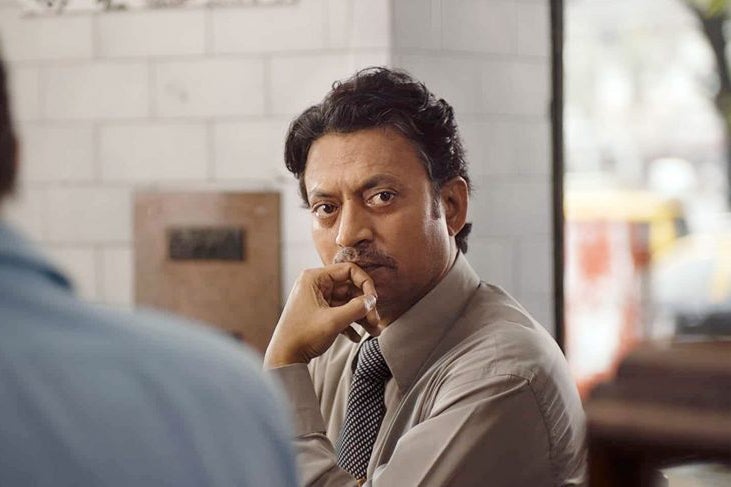
Irrfan Khan in The Lunchbox.
Sikhya Entertainment/DAR Motion Pictures/National Film Development Corporation of India
In the aftermath of Irrfan Khan’s death, at 53, the uniquely international scope of the extraordinary Indian actor’s career has led to the quiet erasure of his best work. Many outlets, both in headlines and general obituary coverage, primarily highlighted his roles in the Western films Slumdog Millionaire and Life of Pi, somewhat understandably, because those Oscar-favorite movies both boosted his global profile significantly. But to reduce his significance to the relatively small roles he had in those movies minimizes why he mattered so much. He actually is probably most recognizable to the average American moviegoer from such big-budget films as The Amazing Spider-Man and Jurassic World, but he did his finest work in his home country, all the way up until his death. He was known in India not just a great actor, but as one of the finest actors ever in a national industry that’s had many to herald.
Irrfan—he dropped his surname professionally, because he didn’t want to be known for his lineage—achieved a rare international celebrity that so few Indian actors, or actors in general, ever reach. He had an unmatched global presence in everything from Bollywood dramas to American action films to Japanese TV shows. With rugged looks and a wily versatility, his talent shone through as both a leading man and a character actor. Following a 2001 breakout in The Warrior, he reached very different audiences around the world in very different ways. His death is an enormous loss. Even India’s usually Muslim-unfriendly prime minister heralded his work.
It may seem hard to imagine now, but not too long ago, a Bollywood crossover star of this standing didn’t really exist, despite multiple unsuccessful attempts from the largest, most prolific film industry in the world. Khan became one of the most recognized Indian actors in the world, and he performed a unique, memorable balancing act between Western cinematic worlds and his Indian roots. As he gradually rose to fame in India, developing from a struggling ’80s TV actor to a bona fide film star by the 2000s, directors abroad took note. In 2007 alone, he had roles in acclaimed films from three different countries: Anurag Basu’s Life in a … Metro, Wes Anderson’s The Darjeeling Limited, and Michael Winterbottom’s A Mighty Heart. Yet even when he became a familiar brown face on the red carpet, he never fully abandoned Bollywood for Hollywood, or vice versa. He would show up in an American blockbuster one moment and then carry a low-budget Indian indie affair right after. He let the breadth of his work speak for itself.
One look from Irrfan sticks in your mind and floats there.
And Irrfan’s Bollywood turns were his most stunning exhibit: Throughout his decadeslong career, he was in everything from blockbusters to indie gems to art house staples. Early on, he portrayed chilling gangsters in movies like Maqbool and Haasil, and often appeared in gritty crime movies and thrillers. But he could also be agile comic relief, like in Piku, or convincingly play a sensitive, lovestruck widower, like in The Lunchbox. His characters could be lonely, cruel, heroic, or vengeful. No matter how famous he became, he never stuck to one type.
The Irrfan performance I think about the most is his role as the titular character in Paan Singh Tomar, a historical biopic about a record-breaking athlete who led an armed insurrection against exploitative village landlords and crooked cops and went on to lead a life of banditry before being killed by police. Tomar’s journey from runner to vigilante is thrilling—Irrfan carries the pain and fury of India’s deprived rural underclasses in every grimace, every monologue roaring with rage, every moment both as a sportsman and dacoit carried proudly and rebelliously. It’s a complex portrait of a man whom most know very little about, and Irrfhan plays it boldly. Tomar is not your standard historical figure, forged and spurred as he is by a venal landowning and corrupt justice system. He, and Irrfhan’s performance, showcases a not-insignificant part of the Indian population—the poor who take up arms because the system fails them so miserably, leaving them to think there’s no other recourse.
On a completely different end of the character spectrum, I also often think of Billu, sometimes known as Billu Barber. Released a year after Slumdog Millionaire, it found Irrfan playing a more understated role: a barber in small village who happens to personally know a famous actor who has come to shoot a film in his area. Once his neighbors find this out, they try to get him to introduce them to the celebrity, although their suspicions soon rise when he is unable to do so. It’s an empathetic film about a microcosm of small-town Indian society and the effects of fame, and Irrfan’s barber is endearing—a humble working-class man who ends up ostracized because of a narrative that spirals beyond his control. Irrfan plays the role humbly, simply, charmingly. You feel and root for him throughout.
All of these films, and more besides, are well worth seeking out and enjoying if only for Irrfan’s presence. Even when he wasn’t the lead, he was the undeniable standout in his films. He could be hilarious, wise, or scary. One look from him sticks in your mind and floats there, a face you’d remember long after you’d seen a movie of his. Both native Indians and the diaspora look to him as nothing less than a titan, and that’s not just because of his international success.
from Slate Magazine https://ift.tt/2Sojy39
via IFTTT
沒有留言:
張貼留言